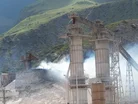EU signs MoU on critical raw materials with Argentina

European Commission President Ursula von der Leyen and the President of Argentina, Alberto Fernández, signed a Memorandum of Understanding last week in Buenos Aires, establishing a partnership between the EU and Argentina on sustainable raw materials value chains.
In a statement released by the commission, the agreement aims to develop a secure and sustainable supply of raw materials necessary for the clean energy and digital transition while also seeking to create a sustainable raw materials industry and economic growth for the benefit of both sides.
A shared commitment to a greener and more resilient future
The EU and Argentina have committed to developing an operational roadmap within six months of the signature of the Memorandum of Understanding. President of the European Commission, Ursula von der Leyen, said, "I am glad to sign this partnership between the EU and Argentina for the development of sustainable raw materials value chains.
"This is truly a win-win. It is a big step forward for the EU's climate ambitions, and it is beneficial to Argentina as a key global player in the clean energy transition. She added that this is "a partnership based on shared commitments to a greener, digital, and more resilient future for all."
The partnership, which aligns with the EU's Global Gateway strategy, is centered around five areas of collaboration; the integration of sustainable raw materials value chains through joint project development, new business models, and the promotion and facilitation of trade and investment routes.
It will include cooperation on research and innovation along the raw materials value chains, leverage environmental, social, and governance (ESG) criteria, and deploy hard and soft infrastructure to minimise environmental and climate impact while strengthening capacities, and skills development per international labour standards.
Thierry Breton, EU's Commissioner for Internal Market, expressed his optimism: "With this Memorandum of Understanding on raw materials between the EU and Argentina, we embark on a mutually beneficial partnership that advances our ambition to secure sustainable supplies and diversify critical resources.
The rising need for critical and strategic raw materials
Demand for crucial raw materials is estimated to skyrocket over the next ten years with strategic sectors like the net-zero industry, the digital industry, aerospace, and defence needing the critical raw materials. However, Europe relies heavily on imports, often from quasi-monopolistic third-country suppliers. Hence, the need to establish new partnerships, achieve its climate and digital goals, and mitigate the risks associated with such strategic dependencies.
Although the EU has already established strategic partnerships on raw materials with Canada (June 2021), Ukraine (July 2021), Kazakhstan, and Namibia (November 2022), the new agreement with Argentina will allow both sides to advance trade and investments into secure, sustainable and resilient raw materials value chains.
Argentina is a producer of copper and holds one of the world's largest lithium reserves. According to the Argentinian government, lithium exports soared 234% in 2022, reaching a 10-year high as demand for the metal does not seem to be decreasing.
Since seventy-five percent of the world's lithium comes from Argentina, Chile, and Bolivia's salt flats, the three countries that make up the "lithium triangle," it is right to say that this partnership will enhance the resilience of EU critical raw materials supply chains.
